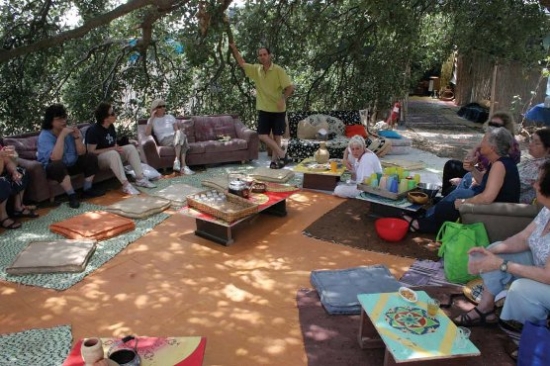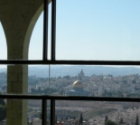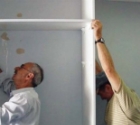
Amiad Lapidot talking to the ESRA group under the ancient tree.
Sixteen of us from the ESRA Garden Club crowded into four cars and were met by Amiad Lapidot in Kerem Maharal, a most beautiful village lodged in the Carmel hills. Amiad is the founder and director of “Eretz Carmel”, a nonprofit organization which aims to promote models of sustainable economic growth.
Our first stop was Amiad's home which at first glance looks like any standard Israeli home. We all took our seats in his living room to listen to his account of how his adventure started, and as we listened and the story unfolded, we realized that we were in a home that was different and unusual. He likes to call his house "a model of sustainability", and so it is. In fact, his mission in life is to live with sustainability: to use the free services that nature has to offer, such as cool winds in the summer and the warmth of the sun for the winter.
The frame of the house is constructed from four large shipping containers made of steel, each 30 cubic meters and weighing 2.5 tons. Thousands of these containers pile up in ports and warehouses. So, in itself, using them was already an ecological gesture, a recycling of sorts. Maximal care was given to insulating the house with bales of straw grown in his own fields and then covering them up with bricks which he made himself from earth and which create a “thermo-mass”. By this means, the house ‘remembers’ the temperature and keeps cool in summer and warm in winter. It’s finished off with plaster which gives the house an air of "normality".
Amiad, 42, lives in the house with his wife and two children. The living area is 120 square meters. They have no air conditioner and he claims that last winter they heated the house for only 11 days. The house has two bedrooms, one office room and a play room for the children. In addition to the normal windows, there are small narrow windows just below the ceiling. The hot air rises and these upper windows evacuate the air. An astute method of pipes built into the ground and leading into the house via air vents placed close to the floor also adds to ventilation. The furniture is simple and functional, mostly made from wood from sustainable forests, as are the wooden window and door frames.
The house collects rain water which is put to good use. The surprise came when we heard that Amiad also collects dew water, and it seems there is a lot more of that than we think. He collects as much as 50 liters of dew per day and he likes to use it for the shower. When someone said she was using the water from the shower and kitchen for her garden, he said we can do that only if we use ecological soap and shampoo. He reminded us that all chemicals and fertilizers that go into the ground reach the aquifers.
Amiad explained the importance of recycling and composting. He distributes several buckets to each household and he comes to collect the organic kitchen waste which he makes into what he describes as the "best compost in Israel". (I went for it and bought two bags.) He also shared with us the fact that doing all of this first started in the mind, as a way of thinking. This driving force eventually spread in his community.
Today, 3000 households cooperate with him in Kerem Maharal and many more in the surrounding communities. Kerem Maharal is known as a village with high ecological standards.
The second part of the visit was to the site of “Kerem Shefa” at the foot of the Carmel mountains and 15 minutes drive from the house along dirt roads through lovely, luscious fields and orchards.
“Kerem Shefa” (shimur p’laey olam – preserving the wonders of nature) is a center for ecological understanding and hosts groups for adventure activities and teaches them how to live with nature. It’s all in the open, with a field kitchen, huts for sleeping and a communal meeting place under a 400 year old tree.
The site itself is not too green or luscious. I had a feeling that a lot of care was taken not to waste any water. Here is where the compost is made. They opted to have a regular toilet. However, the waste does not go into the sewage. By using aerobic and anaerobic procedures, they process the waste efficiently.
Eretzcarmel - www.eretzcarmel.org (The site is also in English).
Kerem Shefa - www.shefa8.co.il (in Hebrew)
 The Morman University Sunday Concert, with ESRA
The Morman University Sunday Concert, with ESRA  Congratulations to ESRA Rehovot on its 10th
Congratulations to ESRA Rehovot on its 10th  THANK YOU!
THANK YOU! From Australia with Love
From Australia with Love Monkey Tales
Monkey Tales A fresh spirit of Zionism from Manhattan
A fresh spirit of Zionism from Manhattan